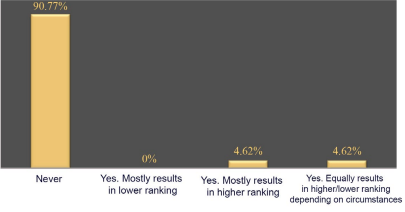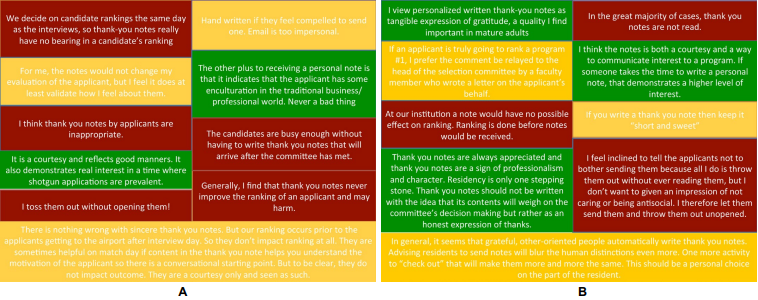INTRODUCTION
The current gold standard is practicing evidence-based medicine. The road to residency is a rigorous one including 4 years of medical school, board exams, applying for residency, interviewing, and hopefully ending with matching at your desired program. What can and should one do after the interview?
Thank you notes after residency interviews remain to be recommended with only one survey done in 2010 asking 2 questions about thank you notes after ophthalmology residency interviews that revealed 14% of faculty members expect or desire them and only 3% are influenced by an applicant stating the program is their first choice.1 Doing a quick Internet search, one can find numerous medical schools recommending thank you notes (UCSF, Drexel, Rutgers,and Iowa to name a few)2,3,4,5 along with residency websites (American Academy of Family Practitioners and Emergency Medicine Residents Association)6,7 and sites geared towards medical students.8
METHODS
A 6 question multiple-choice survey was created using www.surveymonkey.com. The study was granted exempt status by the Institutional Review Board (IRB) of UT Health San Antonio. The survey was distributed to Association of University Professors of Ophthalmology (AUPO) personnel who then distributed it to their respective faculty members that interview and rank applicants. The survey included the following questions: the location of their residency program; their amount of time after training; do they enjoy receiving thank you notes; do thank you notes change their ranking of applicants; do they recommend applicants write thank you notes; and, if so, in what format. They were also allowed to write comments (See Supplementary Data).
RESULTS
Seventy five total people took the survey during the month of March 2016. Their location breakdown was the following: 35% Midwest, 35% Northeast, 9.5% West, 9.5% Southwest, 9.5% Southeast, and 1% anonymous. Fourty point three percent are faculty members for greater than 10 years, 29.2% faculty members less than 5 years, 19.4% residency directors, 8.33% faculty members for 5-10 years, and 2.8% chairmen. Twenty eight percent responded that they are indifferent to receiving thank you notes, 25.3% always enjoy receiving them, 25.3% enjoy them only if personalized, and 21% do not enjoy receiving them. Ninety point eight percent reported thank you notes never change their ranking of applicants (Figure 1); 4.6% responded yes, mostly in higher ranking; 4.6% responded yes, equally resulting in higher/lower ranking depending on the circumstances; and 0% chose yes, mostly resulting in lower ranking. When asked if they recommend applicants to write thank you notes: 46.7% chose no; 33.3% chose yes, only if personalized; 13.3% chose yes; and 6.7% chose yes, only if telling the program you are ranking them #1 (and mean it). Thirty seven percent do not have a preference between emailing thank you note versus hand-written, 21.9% prefer hand-written letters, 4.11% prefer email, and 37% responded non-applicable because do not recommend thank you notes. Twenty six respondents wrote comments at the end of the survey (Figure 2).
Figure 1: Do Thank You Notes Change the Ranking of Ophthalmology Applicants?

Figure 2A and 2B: Comments Provided by Survey Responders.

DISCUSSION
Based on the comments, faculty members remain divided on the viewpoint of writing thank you notes after ophthalmology residency interviews. By in large, thank you notes do not appear to impact the ranking of ophthalmology applicants following interviews and are not seen as a requirement. They do, however, remain an option for an applicant to show their genuine interest in a program and an opportunity for a program to receive further insight into an applicant’s personality.
FINANCIAL SUPPORT
None except Michael A. Singer (see below).
CONFLICTS OF INTEREST
Conflicts of interest only for Michael A. Singer: Allergan, Allegro, Ampio, Genentech, Ophthotech, Regeneron, Santen, Aerpio, Optos, Alcon, Clearside, Notal Vision, Guidepoint, Alimera.
In accordance with Openventio Publishers policy and my ethical obligation as a researcher, I am reporting that Dr. Singer is a consultant for the following companies: Allergan, Genentech, Regeneron, Santen, Clearside, Aerpio, and Alimera. Dr. Singer is a Speakers Bureau for the following: Allergan, Genentech, and Regeneron. Dr. Singer is involved in research support with the following: Allergan, Genentech, Regeneron, Ampio, Optos, Aerpio, Allegro, and Diachii, and Clearside. These affiliations did not affect research reported in the enclosed paper. I have disclosed those interests fully to Openventio Publishers.







